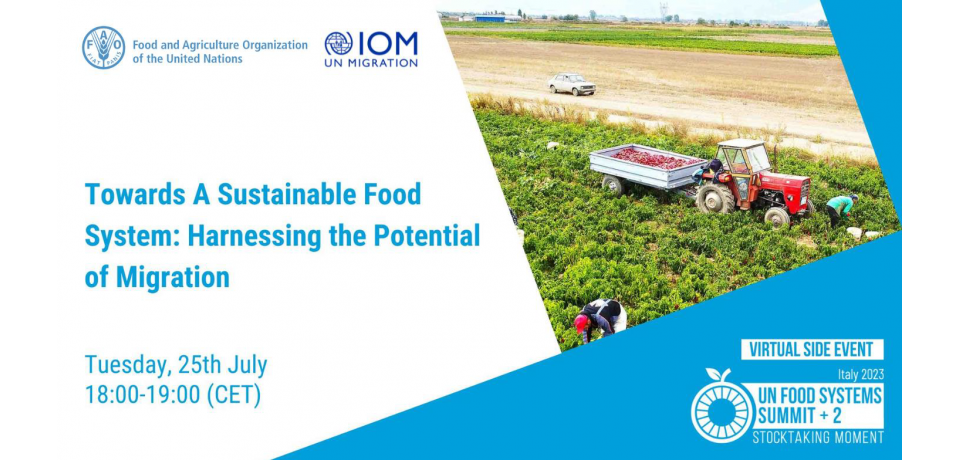Towards a Sustainable Food System: Harnessing the Potential of Migration
Background
Climate change is projected to negatively impact food availability and rural livelihoods. At the same time, more than a quarter of the global farm work is done by migrant workers. Food systems rely heavily on both internal and international migrant workers, who contribute to the food supply and food security through their agricultural labour. Despite this central role, migrant workers face high levels of poverty, malnutrition, poor health, and limited safety and labour protection, increasing their risk of labour exploitation and human trafficking.
To address food insecurity, durable solutions that focus on prevention, adaptation, and long-term resilience are needed to build the adaptative capacity of affected populations. When well-managed, migration can be a powerful driver of sustainable development, adaptation, and resilience in the face of climate change and food insecurity. Migration can allow food insecure individuals better livelihood opportunities, and the remittances migrants send home provide additional income to food insecure households. In addition to food remittances, financial remittances can contribute to household food security in many ways, including supporting the purchase of consumable goods, diversifying household income, and funding the purchase of production inputs. Social remittances, such as innovative ideas and practices, can support the acquisition of new adaptive skills such as climate-smart agriculture in communities of origin.
To harness the potential of migration, food system policies and partnerships must integrate migration considerations. Doing so can act as an accelerator to achieve a sustainable food system and the Sustainable Development Goals.
In the context of the UN Food Systems Summit +2 Stocktaking Moment, the International Organization for Migration and Food and Agriculture Organization will hold a side-event that highlights inclusive food systems transformations and national pathways that recognize the role of safe, orderly, and regular migration in achieving it. The side-event is framed within a comprehensive approach to the migration, climate change, food security nexus, grounded in human rights for the benefit of both migrants and societies.
Objective of the event
This event seeks to raise awareness of the food-migration nexus, including the role of migrants in promoting sustainable food systems, and to share national best practices. The discussion will also highlight the importance of policy coherence for food system transformation, in order to promote a better understanding of the integrated policy action needed to empower migrants to become agents of development in their countries of origin and destination. Furthermore, it will unpack the roles and responsibilities of different actors in ensuring policy coherence.
Panelists will share examples of policy coherence that facilitates migration’s contribution to transforming food systems and examples of cross-sectoral partnerships that provide innovative solutions factoring migration considerations to jumpstart food systems transformations.
Recognizing that food systems transformation cannot occur in silos, a diverse group of actors representing national governments, private sector, diaspora and UN organizations, among other stakeholders, will share their experiences in harnessing the power of migration for sustainable food systems transformations both in countries of origin and destination.
The event will centre on the following questions:
- How can inclusive food systems transformation contribute to making migration a choice rather than a necessity and improving migration outcomes?
- What actions can empower migrants, including diaspora, to contribute to agrifood systems transformation?
- What are the main challenges for migrants’ engagement in making food systems sustainable?
- What are some best practices of migrants’ contribution to developing and practicing climate-smart agriculture?
- What are some national best practices harnessing migration to jumpstart food systems transformation?



